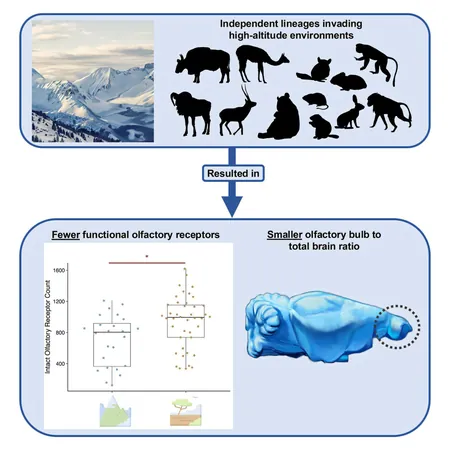
High Elevation Animals: A Surprising Decline in Smell Sensation!
2025-07-01
Author: Wei Ling
Unveiling Evolution at Great Heights
A groundbreaking study published in *Current Biology* reveals a surprising twist in the evolution of animals residing at lofty elevations of 1,000 meters and above: they are losing their sense of smell!
The Study: A Deep Dive into Genes
Researchers meticulously analyzed the genomes of 27 assorted animal species thriving in high-altitude environments, including monkeys, goats, llamas, and guinea pigs, both domesticated and wild. The findings? A staggering 23% decrease in smell-related genes and an 18% shrinkage in the size of their olfactory bulbs—essentially the brain's scent-processing hubs.
Why the Sniffles? Understanding the Environment
But why this olfactory decline? The thin, cold, and dry air at high elevations poses significant challenges like breathing difficulties and nasal congestion. These environmental conditions hinder scent molecules from traveling effectively, resulting in fewer odors for animals to sniff out.
Adapting to Change: Evolving Senses
While the exact mechanisms remain a mystery, it's speculated that the dwindling scents available and ongoing nasal inflammation may play pivotal roles in this sensory shift. Over generations, mountain-dwelling species might have adapted their skills, potentially enhancing vision or other senses to compensate for their diminished smell.
A Look at Human Adaptation
The research also extended to human populations, comparing the genomes of high-altitude Tibetans—who have called the mountains home for 9,000 to 30,000 years—to their lowland Han Chinese counterparts. Intriguingly, no changes in olfactory genes were observed in humans, possibly due to the intermixing of populations or insufficient time for evolutionary changes to manifest.
Revolutionizing Our Understanding of Evolution
This study flips the script on previous research, which largely concentrated on how species acquire new traits to survive extreme environments. Instead, it highlights that loss of certain abilities, like smell, is also a significant aspect of evolution. Such insights could reshape our understanding of evolutionary biology and have profound implications for medical science in the future.
 Brasil (PT)
Brasil (PT)
 Canada (EN)
Canada (EN)
 Chile (ES)
Chile (ES)
 Česko (CS)
Česko (CS)
 대한민국 (KO)
대한민국 (KO)
 España (ES)
España (ES)
 France (FR)
France (FR)
 Hong Kong (EN)
Hong Kong (EN)
 Italia (IT)
Italia (IT)
 日本 (JA)
日本 (JA)
 Magyarország (HU)
Magyarország (HU)
 Norge (NO)
Norge (NO)
 Polska (PL)
Polska (PL)
 Schweiz (DE)
Schweiz (DE)
 Singapore (EN)
Singapore (EN)
 Sverige (SV)
Sverige (SV)
 Suomi (FI)
Suomi (FI)
 Türkiye (TR)
Türkiye (TR)
 الإمارات العربية المتحدة (AR)
الإمارات العربية المتحدة (AR)